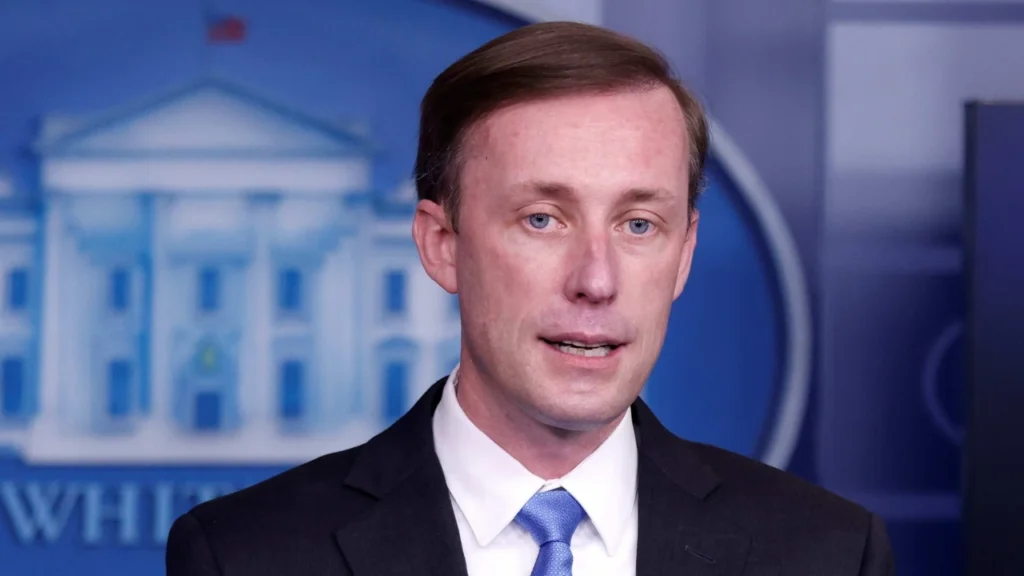
Former U.S. National Security Advisor Jake Sullivan has stirred sharp debate by accusing Donald Trump of undermining America’s partnership with India in pursuit of private business opportunities in Pakistan. Sullivan, a veteran of Democratic administrations and a close aide to President Biden, argued that Trump “sacrificed a strategic relationship for personal gain,” describing it as one of the most underreported failures of his presidency.
Sullivan pointed out that during Trump’s tenure, the relationship with India which many experts consider one of the most consequential partnerships of the 21st century was weakened due to what he termed “business-first diplomacy.” He alleged that the Trump family and its close associates pursued ventures in Pakistan’s growing cryptocurrency sector while also showing interest in securing access to the country’s critical minerals, including lithium and rare earth elements. These business interests, he claimed, dictated foreign policy choices and sidelined India at a time when the United States needed New Delhi as a strategic partner to balance China’s growing influence in Asia.
According to Sullivan, this transactional approach was not simply a policy error but a strategic sabotage. India had been investing heavily in building closer ties with the U.S. on defense, technology, and trade. The Indo-Pacific strategy, shared by both Democrats and Republicans, placed India at its core. Yet Trump’s policies, Sullivan argued, disrupted trust, strained economic relations, and shifted America’s focus toward Pakistan’s short-term offerings instead of long-term cooperation with India.
Broader Criticism of Trump
Sullivan’s charge has not emerged in isolation. Other prominent figures, including former National Security Advisor John Bolton, former U.N. Ambassador Nikki Haley, and commentator Fareed Zakaria, have also criticized Trump’s handling of India. They pointed to his imposition of an additional 25% tariff on Indian goods, which alienated New Delhi, as well as his erratic approach to regional alliances. U.S. media outlets such as The Washington Post and The New York Times have similarly emphasized how Trump often blurred the lines between personal financial interests and America’s national strategy.
Contrast With Biden’s Approach
In contrast, the Biden administration worked to restore momentum in U.S.–India ties. Under Sullivan’s guidance, sanctions on several Indian companies were lifted, civil nuclear cooperation was reaffirmed, and defense and technology collaboration advanced. Secretary of State Antony Blinken also engaged with Indian leadership to reinforce the idea that America sees India not only as a partner of convenience but as a central pillar of its Indo-Pacific vision. Sullivan argued that this continuity is essential and warned against allowing personal business motives to weaken trust in America’s commitments.
The implications of these allegations are far-reaching. If Trump’s foreign policy decisions were indeed shaped by private financial objectives, it raises fundamental questions about the integrity of U.S. diplomacy. For India, the episode underscores the importance of securing bipartisan support in Washington to safeguard its partnership against the fluctuations of American domestic politics. For the United States, it is a reminder that credibility in foreign affairs depends on ensuring that national strategy, not personal profit, drives policy.
In the end, Sullivan’s warning is clear: the U.S.–India relationship is too important to be treated as collateral damage in business deals. If America is to maintain its standing as a reliable partner in Asia, it must protect this partnership from being undermined by political or personal interests.
Why India Matters Strategically
For the United States, India is not just another partner it is a cornerstone of the Indo-Pacific strategy aimed at countering China’s growing influence. Both Republican and Democratic administrations have viewed New Delhi as central to securing trade routes, boosting defense cooperation, and advancing technology partnerships. During the Obama and Biden years, civil nuclear cooperation, defense sales, and joint exercises became the foundation of this strategic bond.
By sidelining India, Sullivan argued, Trump disrupted years of bipartisan effort. Trade frictions rose, tariffs were imposed, and political trust eroded. “The U.S.–India relationship is supposed to be the defining partnership of the 21st century,” Sullivan said. “But President Trump treated it as expendable for short-term business gains.”
Contrast With Biden’s Approach
The Biden administration, in which Sullivan served until recently, worked to undo the damage. Sanctions on Indian firms were lifted, civil nuclear cooperation was revived, and technology and defense partnerships expanded. Secretary of State Antony Blinken repeatedly underlined that India is a key democratic partner, not only in countering China but also in building supply chain resilience and advancing renewable energy.
Sullivan stressed that this continuity is essential. “India must know that America keeps its commitments,” he said. “Allies cannot be left to wonder whether our policies are being dictated by private business deals.” His remarks suggest that rebuilding trust with New Delhi has been a central goal of the Biden team.







Absolutely his return has definitely reshaped global dynamics. With Trump back in office since January 2025, the geopolitical spotlight is burning brighter than ever.